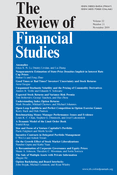-
Views
-
Cite
Cite
C. Wei Li, Ashish Tiwari, Incentive Contracts in Delegated Portfolio Management, The Review of Financial Studies, Volume 22, Issue 11, November 2009, Pages 4681–4714, https://doi.org/10.1093/rfs/hhp013
Close - Share Icon Share
Abstract
This article analyzes optimal nonlinear portfolio management contracts. We consider a setting in which the investor faces moral hazard with respect to the effort and risk choices of the portfolio manager. The employment contract promises the manager: (i) a fixed payment, (ii) a proportional asset-based fee, (iii) a benchmark-linked fulcrum fee, and (iv) a benchmark-linked option-type “bonus” incentive fee. We show that the option-type incentive helps overcome the effort-underinvestment problem that undermines linear contracts. More generally, we find that for the set of contracts we consider, with the appropriate choice of benchmark it is always optimal to include a bonus incentive fee in the contract. We derive the conditions that such a benchmark must satisfy. Our results suggest that current regulatory restrictions on asymmetric performance-based fees in mutual fund advisory contracts may be costly.




